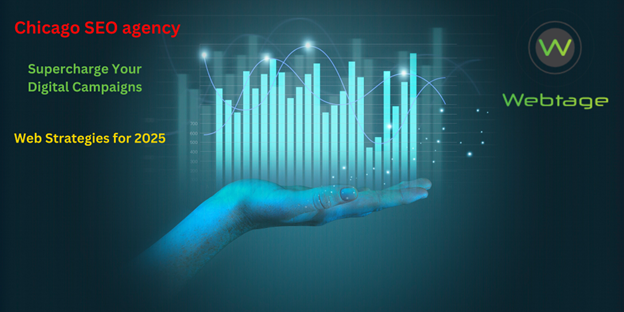The Evolving Landscape of Digital Marketing: How Chicago’s Top SEO Agencies Are Redefining Web Strategies for 2025
The invention of AI seems to be drastically changing how we interact with technology and the internet. Yes, while some may see it as an easy tool to write marketing blogs, to others it represents a seismic shift in how their entire business operates. This is especially true for digital marketing agencies that will have to analyze the impact of AI on search engines and other marketing platforms and determine their response strategies.
In this article we will discuss how the landscape of digital marketing is changing and what strategies digital marketing companies are adopting in order to adapt to this new world.
What is AI?
Artificial Intelligence is a branch of computer science that aims to enable machines to make decisions that traditionally require human intelligence such as problem solving, critical thinking, etc. More recently, AI technologies, particularly a branch of machine learning based on Large Language Models (LLMs), have been applied to applications such as ChatGPT, an AI chatbot, that uses AI to create human-like content responses to questions or demands made by human beings using it.
Generative AI models have undergone extensive training in processing text data. When these models are fine-tuned afterwards, they are able to have a deep understanding of human language and context with some understanding of nuances and they are able to generate texts that all reflect aspects of these types of human communication. They also have a very efficient architecture that enables them to efficiently handle sequential data and capture context over long passages. This enables them to produce text that is coherent and relevant to whatever was asked of it. This makes it a good tool to use for various instances such as summarizing, generating content, etc.
AI, in general, and generative AI, in particular, has started to change the way internet searching is conducted, marketing personalization is done and marketing collateral is generated.
How is AI changing digital marketing?
There are many ways AI is changing digital marketing.
Aid in decision making – One way AI’s algorithms and its data processing ability are helping marketing operations is not just with more data on consumer preferences, sentiment trends, user behavior etc., but also powerful recommendations on how to implement their business strategies.
Time Management – AI can also assist in other tasks such as specific content creation or scheduling social media posts, this in turn leaves time for employees to work on more creative and innovative work instead. All of this means that AI can also be a useful tool in time-efficiency.
Content Generation – As any modern-day marketer can vouch for, generative AI is capable of synthesizing vast amounts of data to generate coherent content – whether it is text, design, or even multimedia content.
Personalized & Nuanced Experiences – AI, especially gen AI, by using AI chatbots, responding to customer questions authentically and in a personalized way. This is also seen in search engine experiences, which is evolving rapidly to include generative AI in order to provide synthesized information to best meet user’s search intent (more on this below).
However, this does not mean that there are no disadvantages to using AI. AI is as accurate as the data it contains, any sort of poor data can lead to misinformation, biases, and even harmful information. There are also security concerns, the more data you enter into the AI system, the more there is a risk of security breach.
Biggest Impact of AI on Digital Marketing Agencies:
Generative Search Experiences – As search engines adopt generative AI technologies, search experiences are changing rapidly, leading to new features and new techniques for gaining visibility on premium real estate on search engine results.
Google has recently adopted AI to help make searches more relevant and easy to-digest for the user. AI overview (AIO) is a tool now used by Google that provides an AI-generated summary at the very top of the Google search page. Along with AIO, search results also feature ‘link cards’ in which links to the websites used for the content generation are placed . This is one premium spot where marketers can hope to be visible.
If you are a Chicago SEO agency, you should have a strategy that deals with the rise of AI in search engine results. As stated before, this new system is changing the way online searches are conducted, and since it comes with its pros and cons, having a planned strategy is helpful to deal with the complexities it brings to digital marketing.
An important strategy in being able to get your website on the ‘link cards’ that is placed next to generative AI results, is by having a good foundational content strategy.
1. Focus on readable content that is aligned to user intent –
An important strategy in this case is to have good content that is simple, aligned to the user intent, and uses first person language. AI overview in particular favors this type of content , especially readability. If your content is high quality and easy to read, it increases the chance of your content being featured as a ‘link card’ on AI overview.
2. Focus on high quality content-
Good content should also focus on projecting experience, expertise, authority, and trustworthiness. Having good, high-value content serves a variety of foundational benefits:
- It can allow the article or multimedia to be indexed by search engines and appear on its first page, this in turn drives high value traffic to your website.
- Having great content can also allow you to publish it on high authority content sites, this in turn creates high quality backlinks that also increase your search visibility.
- It can also increase the chance of higher audience engagement rates and lower bounce rates.
Adoption of Productive AI Tools
Apart from the need to adapt to gen AI-powered search engine changes, AI can be used as a tool for marketing companies to improve their efficiency in many different ways. As a digital marketing agency in Naperville, here are some ways
Chatbots and Customer Engagement – AI-powered chatbots can offer real-time assistance to customers, answering queries and providing personalized experiences, ultimately driving customer satisfaction and retention. As discussed earlier, having chatbots on your website allows for customers to directly interact with an automated system instead of waiting for an actual employee to come and answer questions. These chatbots use natural language processing and machine learning to understand customer requests and questions. making automations a lot smoother and nuanced compared to chatbots of yesterday.
Content Creation: Generative AI can produce high-quality content for blogs, social media, and websites, allowing marketers to maintain a consistent flow of fresh material that engages audiences without the extensive time investment, including:
-
Ad Copy Generation: Marketers can use generative AI to craft compelling ad copy that captures attention quickly. This rapid production of variations helps in A/B testing to find the most effective messaging.
-
Visual Content Creation: AI can assist in generating images or video content based on textual input, streamlining the creative process and ensuring that visual marketing elements align with brand messaging.
-
Product Descriptions: For e-commerce businesses, AI can swiftly generate multiple variations of product descriptions that are engaging and optimized for conversions, improving the overall shopping experience.
Improved Efficiency: From use of AI-powered platforms for lead generation to lead scoring to automating tasks, AI can help marketers manage their time and tasks more efficiently. As a digital marketing company, here are some ways we have been driving more efficiency in our operations:
- Lead Generation – We use gen AI-powered tools to identify potential leads based on behavior patterns, demographics, and engagement metrics. We are also able to scan large amounts of data to approach a potential lead faster, resulting in better consideration. By automating the process of prospecting, we are able to generate qualified leads more efficiently, ensuring our sales teams can focus their efforts on high-potential prospects.
- Scheduling and optimization – Gen AI can automate the creation of content calendars, scheduling posts and campaigns based on predefined themes or seasonal trends, making planning easier. We use gen AI to create social media and email marketing schedules based on our target audience’s behavior, interests and engagement rates.
- Automated Follow-Ups: We have also used AI to automate follow-up emails and messages based on lead interactions. For instance, we have set up chatbot follow ups for our social media ad campaigns. By analyzing responses and engagement levels, AI tools can determine the optimal timing and content for follow-ups, ensuring that no potential lead falls through the cracks.
Performance Improvement:
- Market Research, SWOT Analysis & Trend Analysis – Generative AI can sift through large datasets to identify trends, consumer sentiments, and emerging topics, helping marketers make informed decisions and strategies.
- Personalized Marketing Campaigns – By analyzing customer data, generative AI can create highly personalized email campaigns and product recommendations that resonate with individual preferences, increasing engagement and conversion rates.
- SEO Optimization: We have used gen AI to analyze keywords and suggest blog topics or content structures that are optimized for search engines, boosting organic traffic to websites. Note: we recommend strongly against using gen AI for content creation unless it is strengthened by bringing in your first-hand experience, deep expertise, pointers, evaluation & refinement to make the output useful.
-
Campaign Performance Analysis: AI tools can analyze marketing campaign performance in real-time, providing insights into what works and what doesn’t, allowing marketers to pivot strategies rapidly for better results.




